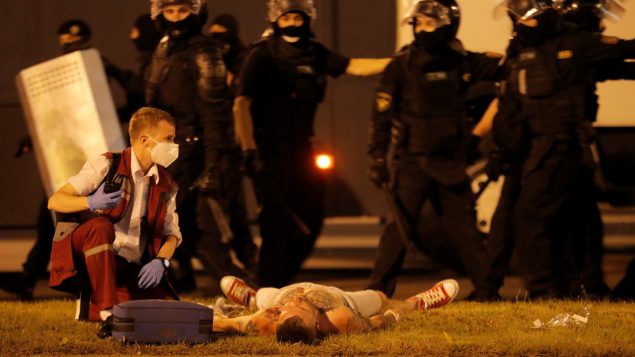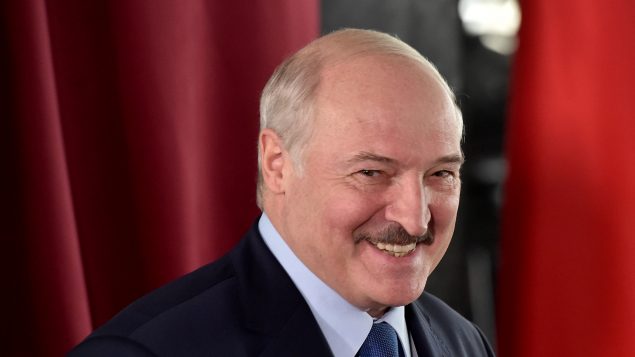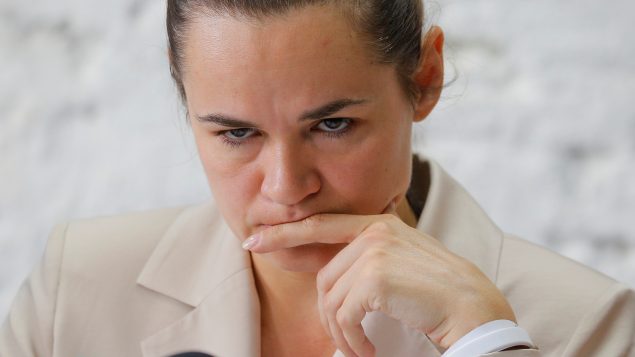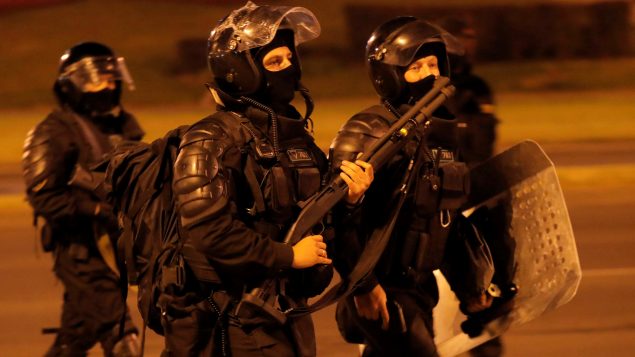Canada is “deeply concerned” by the violent crackdown of Belarusian authorities against protesters who came out in their thousands to voice their discontent with the official results of the country’s presidential election, says Foreign Affairs Minister Francois-Philippe Champagne.
Dozens were injured and thousands detained hours after Sunday’s vote, when police brutally broke up mostly young protesters with tear gas, water cannons and flash-bang grenades and beat them with truncheons. Rights activists said one person died after being run over by a police truck — which the authorities denied.
Belarus’ authoritarian President Alexander Lukashenko warned Monday that the protesters who challenge the official vote results extending his 26-year rule will face a tough crackdown.

Belarusian opposition supporters attend a rally following the presidential election in Minsk, Belarus August 10, 2020. The opposition rejected official election results handing President Alexander Lukashenko a landslide re-election victory. (Vasily Fedosenko/REUTERS)
Election officials said Monday that Lukashenko won a sixth term in office with 80 per cent of the vote, while opposition challenger Sviatlana Tsikhanouskaya got 10 per cent. Tsikhanouskaya dismissed the official results as a sham and submitted a formal request for a recount to the Central Election Commission.
Champagne said the violent police crackdown “further eroded the democratic legitimacy of the vote.”
“The people of Belarus have demonstrated their desire for democracy through their unprecedented mobilization over the past few weeks,” Champagne said. “Free, fair and inclusive elections are critical to any functioning democracy.”
Prior to the election, Canada had voiced its concern over the arrests of opposition candidates, prominent Belarusian bloggers, including Tsikhanouskaya’s husband, and activists for participating in peaceful protests, Champagne said, calling on Belarusian authorities to “exercise restraint and uphold respect for human rights.”
“We will continue to closely follow developments and call for the results of Sunday’s election to reflect the will of the people,” Champagne said.

An injured protester Yevgeny Zaichkin lies on the ground while receiving assistance during clashes with law enforcement officers after presidential election polls closed in Minsk, Belarus, Aug. 9, 2020. Zaichkin who was reported to have died during bloody clashes with police after the presidential election told Reuters he had survived a brutal police beating and that he expected to be detained shortly. (Vasily Fedosenko/REUTERS)
The brutal police crackdown drew harsh criticism from European capitals and will likely complicate Lukashenko’s efforts to mend ties with the West amid tensions with his main ally and sponsor, Russia.
But Lukashenko, whose iron-fisted rule since 1994 has fueled growing discontent in the ex-Soviet nation of 9.5 million, warned that he wouldn’t hesitate to use force again to disperse the opposition demonstrations. He argued that the protesters met a due response overnight after injuring 25 police officers and attempting to take control of official buildings in several Belarusian cities.
“I warned there will be no Maidan, no matter how much someone wants it,” Lukashenko said, referring to neighbouring Ukraine’s 2014 revolution.
“We will not allow the country to be torn apart.”

Belarusian President Alexander Lukashenko visits a polling station during the presidential election in Minsk, Belarus Aug. 9, 2020. (Sergei Gapon/Pool via REUTERS)
The 65-year-old former state farm director asserted that the opposition was being directed from Poland and the Czech Republic, adding that some groups in Ukraine and Russia could also have been behind the protests.
“They are directing the (opposition) headquarters where those sheep don’t understand what they want from them,” he said in a dismissive reference to Tsikhanouskaya and her campaign.
Czech Foreign Minister Tomas Petricek dismissed Lukashenko’s claim, saying his country has not organized any protests.
The Interior Ministry said 89 people were injured during the protests, including 39 law enforcement officers, and about 3,000 people were detained, some 1,000 of them in Minsk. It insisted that no one was killed during the protests and called reports about a fatality “an absolute fake.”

Belarusian united opposition candidate Svetlana Tikhanouskaya attends a news conference following the presidential election in Minsk, Belarus Aug. 10, 2020. (Vasily Fedosenko/REUTERS)
Tsikhanouskaya, a 37-year-old former English teacher without any prior political experience, entered the race after her husband, an opposition blogger who had hoped to run for president, was arrested in May.
She has managed to unite fractured opposition groups and draw tens of thousands to her campaign rallies — the largest opposition demonstrations since the 1991 collapse of the Soviet Union.
With files from The Associated Press, Reuters







For reasons beyond our control, and for an undetermined period of time, our comment section is now closed. However, our social networks remain open to your contributions.